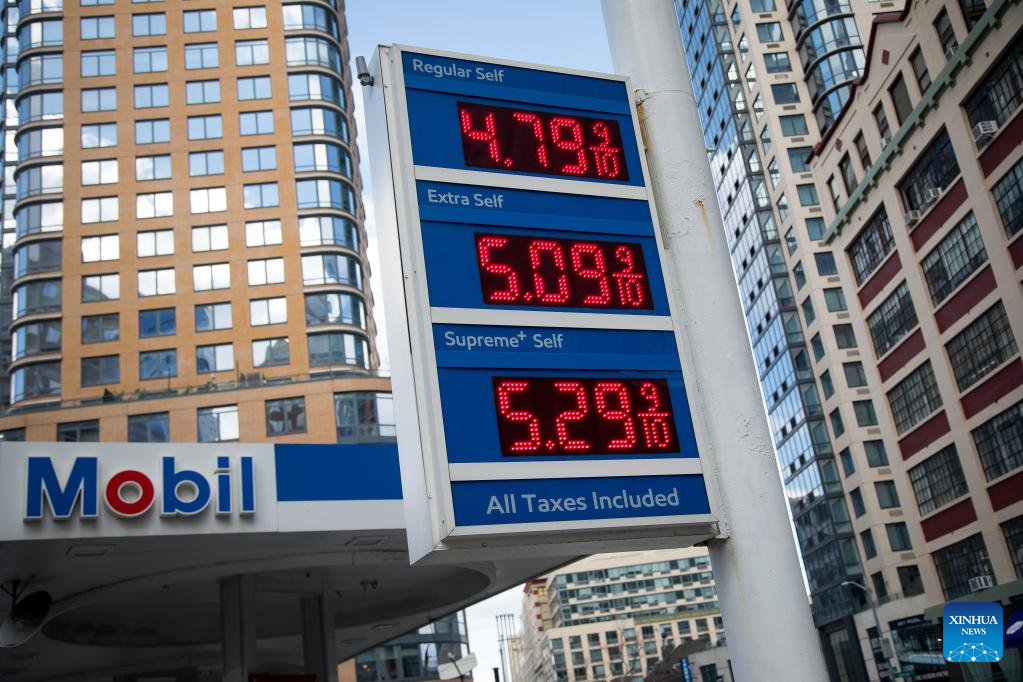Ukraine crisis could shake up US economy even further
 0 Comment(s)
0 Comment(s) Print
Print E-mail Xinhua, March 1, 2022
E-mail Xinhua, March 1, 2022

Helen Carmen, a retiree in her 70s living in Washington D.C., has been paying more at gas pumps than a year ago. Now she fears that the Ukraine crisis could have her paying even more.
Military conflicts "always take a financial toll," she told Xinhua.
The Ukraine crisis could spark a ripple effect in economies worldwide, further drive up U.S. inflation and cause market turbulence, according to economists.
The crisis "would be bad for the world economy, mainly through high oil prices and stock market declines," Desmond Lachman, senior fellow at the American Enterprise Institute and a former official at the International Monetary Fund, told Xinhua.
U.S. inflation could get even worse
Americans are seeing the country's fastest increase in inflation over 40 years, but it could get even worse, as some economists predicted that inflation will hit double-digits due to the Russia-Ukraine military conflict.
As Russia is a major energy exporter, the conflict could raise the cost of oil and spark volatility in markets, causing prices to hit the roof.
If the Ukraine crisis drives oil prices to about $110 a barrel, inflation in the United States would exceed 10% on a year-over-year basis, according to Joe Brusuelas, chief economist at accounting and consulting firm RSM US LLP.
The last time U.S. inflation hit the 10% mark was October 1981 -- 41 years ago. A return to such a scenario could financially harm many Americans.
"Already before the Russia-Ukraine crisis, the U.S. had an inflation problem that was going to force the Federal Reserve to raise interest rates to get inflation under control," Lachman said, adding that the crisis is causing oil prices to rise to seven-year highs because of geopolitical uncertainty.
"Higher international oil prices could exert considerable inflationary pressure and force the Fed to be more aggressive on interest rates. That together with world political instability could keep the world's stock markets on the back-foot for a long time," he said.
U.S. inflation stood at 7.5% in January from a year ago, and prices for certain items, such as beef, have climbed to double-digit increases. The costs for meat and eggs in January have jumped by over 13% relative to last year, according to the U.S. Bureau of Labor Statistics.
Rising gas prices
The national average for a gallon of regular gasoline has increased to 3.604 dollars as of Sunday, much higher than 2.712 dollars a year ago, according to the American Automobile Association, and could climb to 5 dollars or higher in the coming months if oil prices spike even higher, analysts said.
A rise in gas prices would pose a further financial burden for Americans who have long commuted to work or dropped off their children at schools.
Pain at the pumps could also delay the return of millions of Americans to the office after two years of working at home due to the COVID-19 pandemic, which could further harm small businesses, such as restaurants serving the lunchtime business crowd.
Businesses would also be burdened with expenses pushed up by higher oil and gas prices, as goods will cost more to transport. Consumers, as a result, would shoulder the pressure of increased costs, experts said.
Impact on U.S. markets
The stock market could become more volatile until the situation in Ukraine becomes less uncertain, experts said.
Meanwhile, a prolonged downturn of the market could wreak havoc on people's retirement savings and investment plans, and individuals who plan to retire this year may have to put off their plans until the market rebounds.
The cost of taking out car loans, credit cards and mortgages may also rise, as a further increase in inflation could cause the Fed to implement more aggressive rate hikes, economists have said, which could cause people to put off plans to buy homes and cars, and even increase the risk of recession.
In an analysis released by Wells Fargo Securities, economists simulated a scenario in which oil prices are raised by 25 dollars per barrel and equity prices are reduced by 20% between now and the end of 2023, and found that higher oil prices and lower equity prices shave 0.7 percentage point off of U.S. real gross domestic product growth in 2022 and 0.2 percentage point off of the growth rate next year.
"Of course, oil prices could shoot even higher and equity prices could fall even lower than we have modeled. Clearly, the growth impeding effects of these shocks could be more significant under more extreme scenarios," economists said.






Go to Forum >>0 Comment(s)